I started to realize that cancer was a very serious word when I was a child. My mom was then a physician, so I had heard firsthand about how devastating this disease was. Through the inspiration and encouragement of my mom, I was determined to become a researcher to work on how to cure cancer ever since my childhood,

My early dream became a reality after I moved to the United States for graduate school. I chose to study colon cancer as my graduate research project. After I finished my graduate work, I focused my post-doctoral research on pancreatic cancer because I was inspired by my mentor, Dr. Teresa Brentnall. For years, Dr. Brentnall has been deeply involved in the care of pancreatic cancer patients in Seattle, Washington, as well as research aimed at improving earlier detection and diagnosis of the disease.
A few years ago, after I finished my post-doctoral training, I applied for a grant to support my pancreatic cancer research. For people like myself, who are just finishing their post-doctoral training, usually the first grant is the most difficult to obtain, because you have not yet established your credentials.
At this critical time, I received a Pancreatic Cancer Action Network Career Development Award to initiate a project searching for biomarkers for early detection of pancreatic cancer. With this grant, I was able to carry out a pilot study, and generate convincing data and publications that eventually led to five years of follow-up funding from the National Institutes of Health (NIH).
Although the NIH is the main resource for providing cancer scientists with research funding, private funds raised through the Pancreatic Cancer Action Network are very important to support research into pancreatic cancer in a unique way. This organization is especially focused on providing grants to foster early-career researchers in pancreatic cancer and providing support for innovative projects.
Receiving a diagnosis of pancreatic cancer is perhaps one of the hardest things a person could ever face. If I were in this situation, I would allow myself to grieve over this for a few days. But I would need to get back to reality after that. It is important to be positive in the fight against this disease. Moreover, if you are proactive, you would know that there are a lot of things that you could do to improve the lives of yourself and your loved ones after the diagnosis. Things like learning more about pancreatic cancer, exploring treatment options and seeking support groups can be very helpful.
More importantly, keep your hopes up. You are not fighting this disease alone. Many caregivers, doctors, researchers and supporters are also fighting along with you in different ways you may not realize.
2006 Pancreatic Cancer Action Network – AACR Career Development Award
Ru Chen, PhD, University of Washington, Seattle
Biomarkers for Early Detection of Pancreatic Cancer





